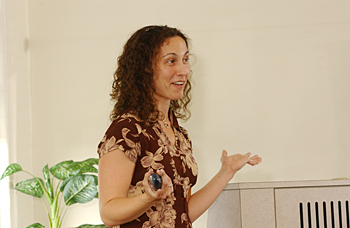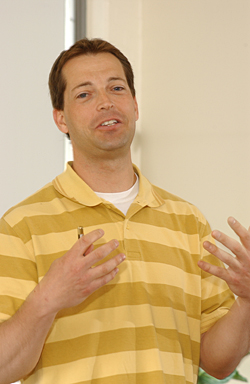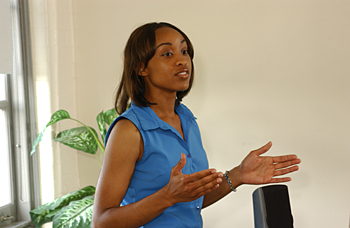Capping the inaugural year of the academic mentoring partnership between UD NSF fellows and high school science teachers from the New Castle County Vocational Technical (Vo-Tech) School District, the event drew approximately 30 guests and featured brief presentations by the nine fellows on their teaching experiences during the past year at Howard and Delcastle high schools.
“The fellows have exceeded my expectations for their success,” George Watson, senior associate dean of UD's College of Arts and Sciences said in his opening remarks. “The benefits to the partnering teachers, their students and the school district also have been evident...[and] it is making a huge difference on our campus and the partnering school district.”
The venture, a three-year, $1.7 million grant to UD funded by the NSF Graduate Teaching Fellows Program in K-12 Education, links UD science graduate fellows with science classrooms in the New Castle County Vo-Tech School District to enhance science curricula and pedagogy in northern Delaware. Watson said one of the main objectives of the program is to expose graduate students and teachers to each other and develop partnerships with local school districts.
Presentations highlighted classroom successes and focused on creative approaches the fellows had devised to convey difficult scientific concepts to high-school students in the New Castle County Vo-Tech School District.
Classroom projects ranged from innovative, hands-on ventures, such as the “DNA mailbox,” to more nuts-and-bolts efforts like journaling and technical writing rubrics. While all fellows said they found the classroom experience helped them with their own research, many also gained an appreciation of pupil-mentor dynamics and how students acquire knowledge.
“The most beneficial thing to students was having someone else in the classroom who could answer questions besides the teacher,” Anissa Brown, a biological sciences doctoral candidate fellow, said.Brown added that her teaching experience, while confirming her decision to pursue an administrative career in science, gave her a deep appreciation for teachers and helped cement her own scientific knowledge. “Communicating difficult concepts to high school students not familiar with the terminology helped me with my own research,” she said.
For three academic years the NSF grant gives nine qualified UD fellows the opportunity to partner with high-school science teachers in the New Castle County Vo-Tech School District. Each fellow receives a $30,000 stipend and tuition waivers to work in high-school science classrooms two days a week, learning about teaching and sharing their own expertise in their chosen fields. Fellows spend 10 hours a week in the classroom while completing their own research for their dissertations.
Marguerite McDonald, a chemistry and biochemistry doctoral candidate fellow, said that her teaching experience in the science classroom of Ralph May at Howard High School allowed her to realize her goal of “engaging and challenging all students.” It also, she said, allowed her to show young learners how “chemistry relates to the real world.”
Through a series of complex questions about chemistry, McDonald developed a writing rubric that challenged students to write about difficult concepts with clarity and solid usage skills that drew on the English curriculum.
“I came up with the idea of students making their own journals and integrated the exercises with what they were learning in English,” McDonald said. “Journaling was effective, too, because it gave me a way to give students immediate feedback.”
Presentations were made by UD fellows Anissa Brown, a biological sciences doctoral candidate; Brian Danysh, a biological sciences doctoral candidate; Genevieve Griffiths, a biological sciences doctoral candidate; Thomas Madura, a physics and astronomy doctoral candidate; Marguerite McDonald, a chemistry and biochemistry doctoral candidate; Fayth Miles, a biological sciences doctoral candidate; Rose O'Connor a biological sciences doctoral candidate; John Shaw, a physics and astronomy doctoral candidate; and Katherine Skalak, a geological sciences doctoral candidate.The nine 2007 UD fellows (two of whom also were fellows for 2006), are Mary Boggs, a biological sciences doctoral candidate; Brian Thomas Ekiert, a physics and astronomy doctoral candidate; Erin Foster, a biological sciences doctoral candidate; Kristy Longsdorf, a chemistry and biochemistry doctoral candidate; Thomas Madura, a physics and astronomy doctoral candidate; Nathan Nazdrowicz, an entomology and wildlife ecology doctoral candidate; Christopher Russell, a physics and astronomy doctoral candidate; Katherine Skalak, a geological sciences doctoral candidate; and Jeffrey Spraggins, a chemistry and biochemistry doctoral candidate.
Article by Becca Hutchinson
Photos by Duane Perry





